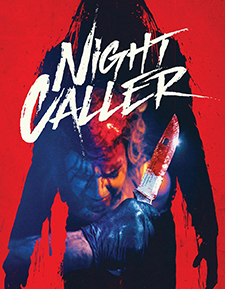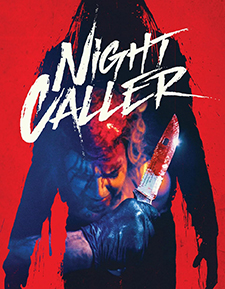Night Caller (Blu-ray Review)

Director
Chad FerrinRelease Date(s)
2021 (August 27, 2024)Studio(s)
Crappy World Films/Girls and Corpses Films (Dark Star Pictures/Vinegar Syndrome)- Film/Program Grade: B
- Video Grade: A
- Audio Grade: A
- Extras Grade: A+
Review
Night Caller is a horror film that draws from other genres to create a tense tale of a violent serial killer. Combining mystery and terror, it focuses on a woman whose psychic ability is turned against her.
Clementine Carter (Susan Priver) is a telephone medium trying to put her bad marriage behind her. She works at a call-in center for the owner, Jade (Bai Ling), and takes care of her bedridden father (Robert Miano), who’s recovering from a stroke and spends his days watching classic horror films. Her routine is shattered when she begins to receive unsettling phone calls at work that cause her to see premonitions of violence and murder. The calls are from a serial killer who enjoys causing these visions and uses her foresight to help him in his evil pursuit.
Clementine doesn’t call the police because her parents, also gifted with second sight, assisted the police years earlier to locate and capture serial killer Dick Lubitz (Lew Temple) and were then subjected to public scrutiny and became suspects themselves. She feels that law enforcement won’t take the concerns of a medium seriously. However, she’s so troubled by the calls that she determines to do what she can to stop the gruesome murders.
Night Caller has a lot of good points. It establishes a mood of foreboding from the outset and balances it by showing Clementine as a devoted daughter caring for her father. Somewhat older than typical horror heroines, she doesn’t make numerous dopey decisions. We accept her as a real person rather than a horror flick cliche, but the script does draw her into danger in an uncharacteristic development. The backstory of her family is interesting and nicely connects to the current story. The music is exceptionally good, playing nearly non-stop throughout the picture and keeping tension high. In terms of the mystery aspect, the film keeps us guessing, since the killer’s face is only seen in deep shadow, with features obscured.
Unfortunately, the film has problems. The character of Jade is so over the top, she’s almost a cartoon. Bai Ling’s line delivery is so frenetic and she’s costumed in such loud, provocative outfits that her Jade never registers as anything but a distraction. Jade uses her psychic ability along with Clementine’s to try to fend off the killer, but her hyperactive manner isn’t at all convincing. As Clementine, Priver has good on-screen rapport with Miano, but she looks more like his contemporary than his daughter. Clementine’s former husband shows up in two scenes, but they aren’t necessary. When she’s interviewed by the police, their questions seem designed more to remind us of plot points than to elicit clues about the killer. The killer’s calls to the call center ramble and go on too long. Taking time to show Clementine deal with a regular caller before the killer phones in would have demonstrated that her abilities are real and not just a ploy to rip off gullible customers.
The murders are shown in extreme, gory detail with prolonged, torturous stabbings, enormous amounts of blood, and evisceration by a lingering camera that wants to make sure every second of special effects and make-up effects is appreciated. Some of the film’s grisliest images include knives slicing into flesh, and scalpings.
Writer/director Chad Ferrin uses a psychic as the focus of an original story with elements of Psycho, Maniac, Friday the 13th, and Henry, Portrait of a Serial Killer, and keeps the pace brisk. Performances, with the exception of Bai Ling’s, work well, and Priver convinces as the deeply troubled medium. Miano injects a bit of comic relief as the horror-film loving invalid and devoted father. The final third of the film leads to a lot of bloodshed, ties together plot elements, and offers an explanation for what motivated the killer to commit such heinous acts.
Night Caller was captured digitally by director of photography Kyle McConaghy with Blackmagic URSA Mini Pro cameras with Lomo spherical lenses, and presented in the aspect ratio of 2.35:1. The opening sequence has a desaturated look, giving the vibe of a 1970s low-budget horror film. Scenes in the call center are dark, with light from computer screens reflected onto the faces of Clementine and Jade. Subjective shots show the killings from the murderer’s point of view. A long staircase, shown during the credits sequence and several times during the film, offers an atypical, eerie location. Blood dominates the murder sequences, with the camera lingering on the gore. Miano wears a terrible wig, which is surprising considering the painstaking efforts with special effects and make-up.
There are three soundtrack options: English 5.1 DTS-HD Master Audio, English 5.1 Dolby Digital, and English 2.0 Stereo. English SDH subtitles are also available. The score by Richard Band is extremely good and contributes greatly to the film’s mood. Heard almost continuously, it shores up slower scenes and adds drama to violent scenes, and has a Bernard Herrmann feel. Dialogue is problematic as far as the call-in killer and Jade are concerned. The killer speaks in a low rasp to disguise his actual voice, but that makes some of what he says unclear. As Jade, Bai Ling speaks so quickly and in such a high pitch that some of her dialogue doesn’t come through. Her overly stylized acting choices interfere with her ability to be understood clearly. Sound effects include squishy sounds of a knife plunging into flesh, gun shots, and horror movie soundtracks from the films Clementine’s father watches.
Bonus materials on the Region A Blu-ray release from Dark Star Pictures include the following:
- Audio Commentary with Chad Ferrin
- Making-Of Featurette (16:47)
- Deleted/Alternate Scenes (41:20)
- On-Set Gallery
- Storyboard Gallery
- Original Song Remix (1:36)
- Official Trailer (1:34)
- Fest Trailer (1:54)
- Teaser (1:17)
Director Commentary – Writer/director Chad Ferrin says that the long staircase shown in the film is located in the Silver Lake section of Los Angeles, not far from where he lives. The opening gives Night Caller a 70s/80s grindhouse feel. A Betamax gives the film a retro look. Ferrin has done a few films since Night Caller. He speaks about an accident that sent key actor to the hospital. Night Caller was the first time Ferrin worked with director of photography Kyle McConaghy, who wanted to cancel the film after the accident. But driven by the show biz mantra “The show must go on,” Ferrin made some quick changes. Robert Miano had to take over that role as well as playing Clementine’s father. There was no time to re-group. Ferrin cautions that there must always be a back-up for actors and crew members: “Time is money.” The film cost $80,000, with $30,000 deferred payment, and had a very brief shooting schedule. “Making a successful, profitable film is as rare as being struck by lightning.” It takes time for a film to recoup its cost. Ferrin worked fast and “got out there” to promote it. He says once a film is in theaters, he simply has to hope the audience will enjoy and support it. There are “lean times” for filmmakers, but having the freedom to make the kind of films he wants to do is a priority. He goes off on a tangent about naysayers online who are the political correctness police and seem to delight in tearing down work they don’t agree with. You try to live “the best life you can,” but the anonymity of the Internet emboldens some to diminish the work of others.
Making-Of Featurette – Behind-the-scenes footage is shown of the special effects team preparing props and make-up effects, crew members putting up the call center set, Bai Ling recording dialogue, and director and cast members joking around. The director speaks about making the dialogue flow realistically. The key actor’s accident and its effect on filming is recounted. Rehearsals are shown and an on-screen statement says that the assistant director doesn’t appear in the featurette because of Covid. A number of crew members are shown wearing masks.
Deleted/Alternate Scenes – These include first murder and lead-up; killer enters couple’s bedroom; killer hums as he walks to his car; Clementine speaks to killer on the phone; Jade takes call from killer; killer threatens Clementine from the rear seat of her car; Jade gets hysterical when she foresees a tragedy; Jade warns Clementine’s father; flashback of killer Dick Lubitz being arrested; Dick Lubitz and son Andrew; Clementine interviewed by the cops; and Clementine attacked.
On-Set Gallery – Color production stills, behind-the-scenes photos, shots of the crew filming scenes and the director of photography setting up shots are shown in slideshow format.
Storyboard Gallery – This slideshow presents elaborate storyboards containing drawings of the shots, camera direction and dialogue (if any). Direction, movement, and framing are all indicated on the storyboards.
Original Song Remix – A remix of the song That’s All Right, written and performed by Arthur Cradup, is heard.
Night Caller starts well but becomes adrift in horror movie cliches, the main one being: The heroine will always go toward danger, never away from it. Of course, there would be no movie if she did the smart thing, but it’s always an annoying flaw in horror films, both good and poor. Ferrin knows how to craft a horror film to maximum effect considering its limited budget. Fans of gory, bloody horror likely will enjoy the film and overlook its shortcomings.
- Dennis Seuling

